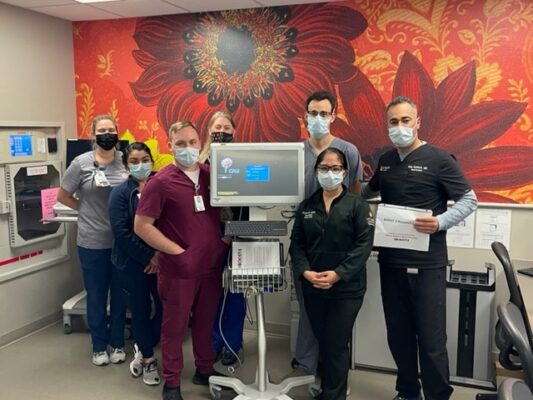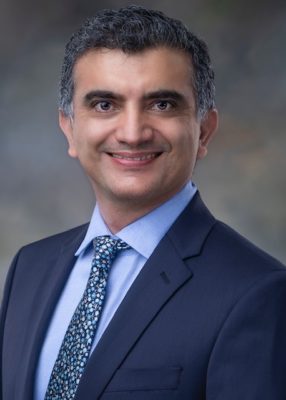Research

BOOST-3 Trial Enrolls First Patient
March 23, 2022
The Department of Neurosurgery at UT Health San Antonio is at the forefront of combating traumatic brain injury and improving the health of our community in Bexar County and South Texas. In collaboration with many institutions across the nation, we have launched the BOOST-3 trial at our center to investigate treatment strategies for severe traumatic […]
Dr. Seifi Co-Authors New Article about Takotsubo Cardiomyopathy
March 22, 2022
Ali Seifi, MD, FNCS, FCCM, served as the principal investigator of a research project describing the nationwide analysis of the association of Takotsubo cardiomyopathy (TC) with aneurysmal subarachnoid hemorrhage (aSAH). TC is a cardiomyopathy, usually the result of severe emotional or physical stress, and that is often precipitated by aSAH. The study’s findings were recently […]
Caregiver SOS Podcast Features Alexander Papanastassiou, MD
March 10, 2022
Caregiver SOS, a podcast from the WellMed Charitable Foundation, recently interviewed Alexander Papanastassiou, MD, about his involvement in a landmark surgery utilizing deep brain stimulation as a prospective treatment for mild Alzheimer’s disease. You can listen to the podcast by visiting this link.
TPR Shares Article about Landmark DBS Surgery for Alzheimer’s Disease.
March 1, 2022
Texas Public Radio recently published an article describing Dr. Papanastassiou’s involvement in a landmark surgery utilizing deep brain stimulation (DBS) as a prospective treatment for mild Alzheimer’s disease. You can read the article and learn more about the surgery by visiting the link below: TPR Article
Alexander Papanastassiou, M.D., Interviewed for KSAT’s Morning Show, GMSA @9
February 22, 2022
Alexander Papanastassiou, M.D., was recently interviewed on KSAT’s morning show, GMSA @ 9, where he discussed his team’s landmark surgery utilizing deep brain stimulation (DBS) as a prospective treatment for mild Alzheimer’s disease. You can watch the interview by visiting this link.
Alexander Papanastassiou, M.D., Co-Authors Study Examining Effects of VNS Therapy on Cerebral Blood Flow
February 17, 2022
Alexander Papanastassiou, M.D., recently co-authored a study comparing cerebral blood flow changes in baboons with epilepsy who were treated with different frequencies of vagal nerve stimulation (VNS) therapy. VNS involves the use of a device (that is often surgically implanted) to stimulate the vagus nerve with electrical impulses. Because many individuals who suffer from epilepsy […]
Alexander Papanastassiou, M.D., Interviewed For Daily Dive Podcast
February 16, 2022
Alexander Papanastassiou, M.D., was interviewed for an episode of the Daily Dive podcast on the iHeartRadio platform where he discussed his team’s recent landmark surgery utilizing deep brain stimulation (DBS) as a prospective treatment for mild Alzheimer’s disease. You can listen to the podcast episode by visiting the link below:
First South Texas DBS Surgery for Alzheimer’s Performed by Alexander Papanastassiou, MD
February 4, 2022
The Department of Neurosurgery is excited to share the news that Alexander Papanastassiou, MD, performed surgery on the first patient in South Texas to be part of a new study evaluating the effectiveness of deep brain stimulation (DBS) to treat patients with mild Alzheimer’s disease. You can read more about this surgery and the study’s […]

Clinical Neurology and Neurosurgery Publishes Review about Relationship Between Intracerebral Hemorrhage Patients Outcomes and Pharmacologic Thromboprophylaxis
December 31, 2021
Clinical Neurology and Neurosurgery recently published a comprehensive literature review and meta-analysis mentored by Ali Seifi, MD, FACP, FNCS, FCCM, in collaboration with Harvard School of Medicine. The study was designed to compare the clinical outcomes of intracerebral hemorrhage patients with and without pharmacologic thromboprophylaxis. You can learn more about the study’s findings by visiting […]
Journal of Maternal-Fetal & Neonatal Medicine Publishes PRES Review
December 14, 2021
The Journal of Maternal-Fetal & Neonatal Medicine recently published a review about posterior reversible encephalopathy syndrome (PRES) mentored by Ali Seifi, MD, FACP, FNCS, FCCM. The article describes the comprehensive pathophysiology of PRES, as well as clinical, diagnostic, and therapeutic intervention during pregnancy. You can learn more about the article’s findings by visiting this link.
